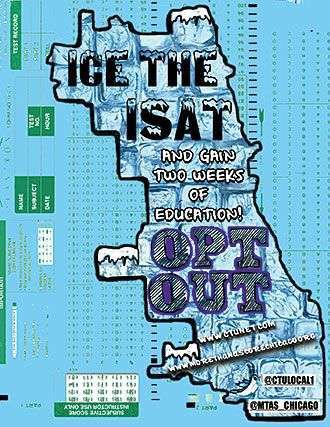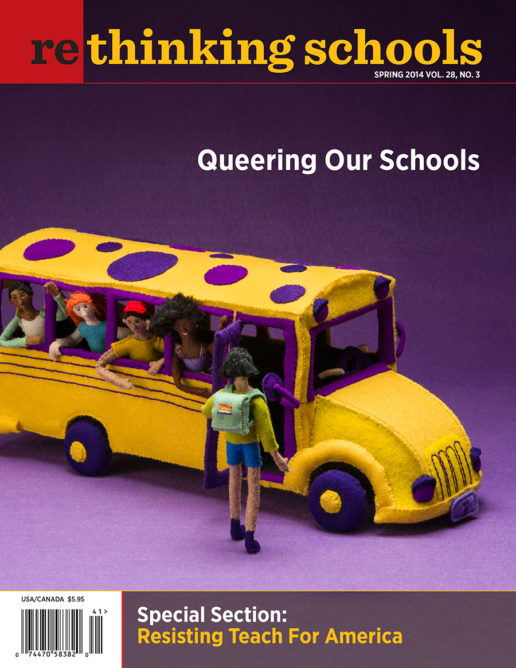Short Stuff 28.3
Testing Boycott in Chicago

Teachers at two Chicago schools—Maria Saucedo Elementary Scholastic Academy and Thomas Drummond Elementary (Drummond Montessori)—voted to refuse to distribute the Illinois Standards Achievement Test (ISAT) to their students in the beginning of March. At Saucedo alone, more than 350 parents turned in opt-out forms for their children. As Saucedo special education teacher Sarah Chambers told Rethinking Schools editorial associate Jesse Hagopian: “Saucedo is taking this step of civil disobedience because the inhuman amount of over-testing has spiraled out of control and we are advocating for our students’ education. This is one step towards reclaiming our public schools and our humanity.”
According to Cassie Creswell, an organizer with the anti-testing group More than a Score (as reported by the Chicago Sun-Times.com) overall at least 1,500 students from more than 80 schools opted out of the ISAT. The school district and the state responded with threats, tripping over each other with contradictory messages. For example, the Illinois State Board of Education told parents it was against the law to opt their children out of the test; Chicago Public Schools (CPS) said the opposite. The district threatened teachers that they could lose their state certification for participating in the boycott. Then they told teachers to distribute tests to children whose parents had opted out. A group of 35 parents, furious that the district was forcing children to choose between listening to their parents and their teachers, asked the American Civil Liberties Union to file a lawsuit. Events continued to unfold as we went to press, and the opposition to testing continued to build.
Call for Congressional Investigation of High-Stakes Testing
A growing movement to free public education from the grip of testers and privatizers—and to put the needs of children back at the forefront—was on display in Austin, Texas, in early March. More than 400 advocates and activists came from across the country to attend the first national conference of the Network for Public Education (NPE).
Grassroots educators and parents engaged in spirited dialogue with historian Diane Ravitch, Chicago Teachers Union President Karen Lewis, and Perrin-Whitt (Texas) school superintendent John Kuhn. Panel topics included Common Core, opting out, organizing resistance, charter schools, social justice unionism, messaging and campaigning for public education, the role of parents, higher education, and more. Workshop sessions were packed and conversations continued in the halls and lobbies throughout the weekend.
The conference reflected the growth of a strong pro-public education presence on social media. Well-known education bloggers—including Anthony Cody, Jose Vilson, Leonie Haimson, Julian Vasquez Heilig, Sabrina Stevens, and others—helped bring people to Austin and give shape to a national network that has, over the past several years, changed the online conversation about education policy and reform. College students resisting Teach For America and activist youth from Chicago and Providence were also prominently featured.
The conference ended with a “call for congressional hearings to investigate the overemphasis, misapplication, costs, and poor implementation of high-stakes standardized testing in the nation’s K-12 public schools.” The call asks Congress to investigate the “unintended consequences” of high-stakes testing, saying: “There is a danger that tests now seem to have become the purpose of education, rather than a measure of education.”

